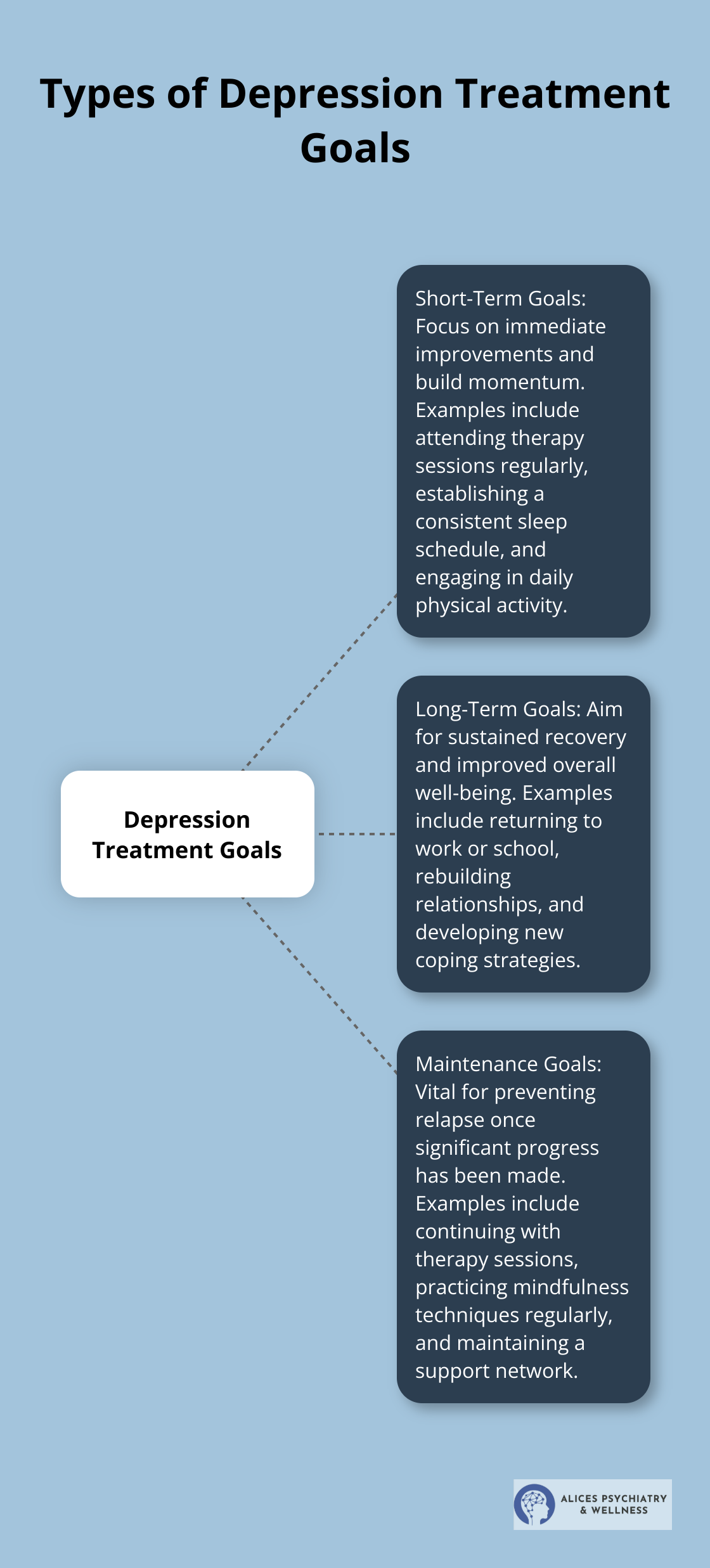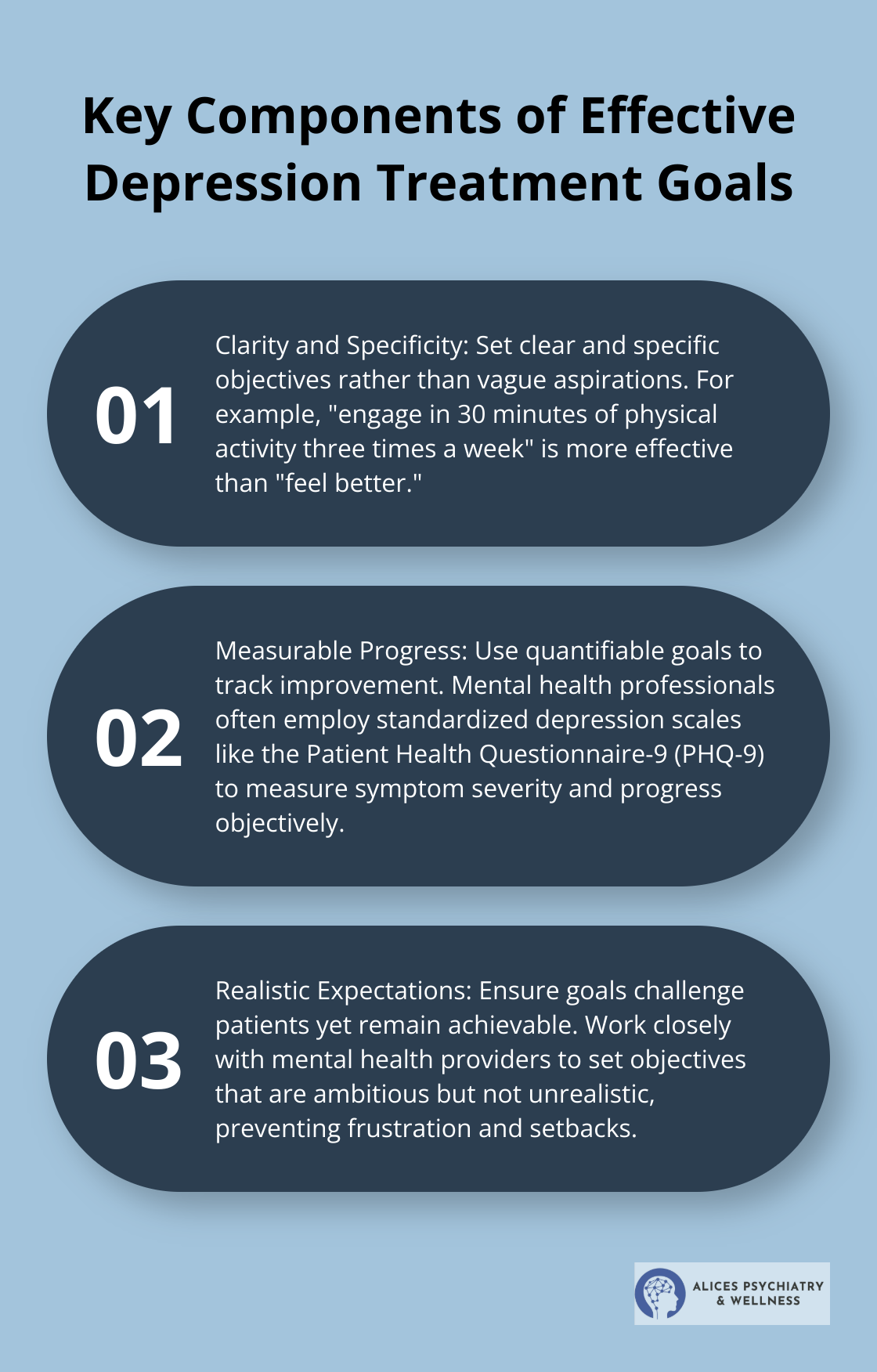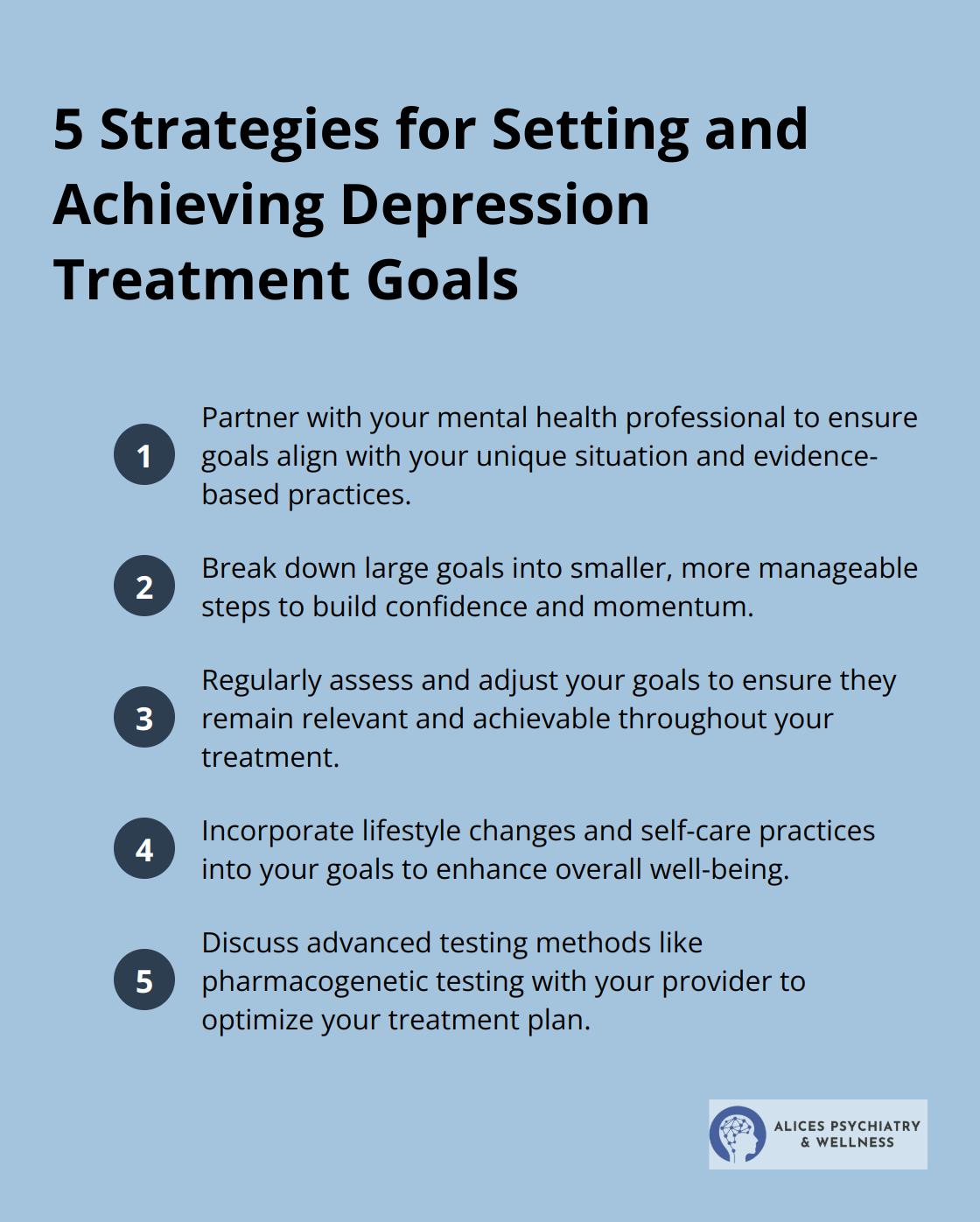Depression affects millions of people worldwide, impacting their daily lives and overall well-being. At Alice’s Psychiatry and Wellness, we understand the importance of setting effective treatment goals for depression to guide the recovery process.
Establishing clear, personalized objectives can significantly enhance the effectiveness of therapy and medication interventions. This blog post will explore strategies for creating and achieving meaningful treatment goals, empowering individuals to take an active role in their mental health journey.
What Are Depression Treatment Goals?
Depression is a complex mental health condition that affects millions of people worldwide. Treatment goals serve as essential guideposts in the journey towards recovery from depression, providing direction, motivation, and a way to measure progress.
Short-Term Goals: Building Momentum
Short-term goals focus on immediate improvements and help build momentum in the early stages of treatment. These objectives might include:
- Attending therapy sessions regularly
- Establishing a consistent sleep schedule
- Engaging in daily physical activity
These small, achievable goals create a foundation for larger changes and improvements in mental health.
Long-Term Goals: Sustainable Recovery
Long-term goals aim at sustained recovery and improved overall well-being. Examples of long-term goals include:
- Returning to work or school
- Rebuilding relationships
- Developing new coping strategies
These objectives often require more time and effort but lead to significant improvements in quality of life.

Maintenance Goals: Preventing Relapse
Maintenance goals are vital for preventing relapse once significant progress has been made. Some maintenance goals might include:
- Continuing with therapy sessions (even if less frequently)
- Practicing mindfulness techniques regularly
- Maintaining a support network
These goals help individuals sustain their progress and manage potential triggers or setbacks.
Personalized Goal Setting
Effective treatment goals should be tailored to each individual’s unique needs and circumstances. Factors to consider when setting personalized goals include:
- Severity of depression symptoms
- Personal values and priorities
- Available support systems
- Co-existing mental or physical health conditions
Personalized goal setting can help make things seem more manageable, enabling the patient to feel supported and have ownership of their care, and to avoid disengagement.
As we move forward, it’s important to understand the key components that make depression treatment goals effective. These elements will help ensure that the goals set are not only meaningful but also achievable and measurable.
What Makes Depression Treatment Goals Effective?
Clarity and Specificity
Effective depression treatment goals require clear and specific objectives. Vague aspirations like “feel better” don’t provide a concrete path forward. Instead, patients should set precise targets. For example, “I will engage in 30 minutes of physical activity three times a week” offers a clear, actionable goal. This specificity allows for easier tracking and provides a sense of accomplishment when achieved.
Measurable Progress
Quantifiable goals play a vital role in tracking improvement. Mental health professionals often use standardized depression scales (such as the Patient Health Questionnaire-9 or PHQ-9) to measure symptom severity. The PHQ-9 is a comprehensive assessment consisting of nine items that measure the frequency and intensity of common depression symptoms. A goal might involve reducing the PHQ-9 score by 50% within three months. This approach provides objective evidence of progress, which can motivate patients significantly.

Realistic Expectations
While ambition deserves praise, unrealistic goals can lead to frustration and setbacks. Mental health providers should work closely with patients to ensure their objectives challenge yet remain achievable. For instance, rather than aiming to “never feel sad again,” a more realistic goal might involve reducing the frequency of depressive episodes over the next six months.
Personalized Approach
Effective treatment goals should align with each individual’s unique needs and circumstances. Factors to consider when setting personalized goals include:
- Severity of depression symptoms
- Personal values and priorities
- Available support systems
- Co-existing mental or physical health conditions
A personalized approach can make goals seem more manageable, enabling patients to feel supported and take ownership of their care (thus avoiding disengagement).
Collaborative Goal-Setting
The process of setting effective treatment goals requires collaboration between patients and mental health professionals. This partnership ensures that goals remain meaningful, achievable, and aligned with the patient’s overall treatment plan. Through open communication and shared decision-making, patients can actively participate in their recovery journey.
As we explore these key components of effective depression treatment goals, it becomes clear that a thoughtful, individualized approach yields the best results. The next section will discuss strategies for implementing these goals and overcoming common challenges in the treatment process.
How to Set and Achieve Depression Treatment Goals
Partner with Your Mental Health Professional
The first step in setting effective goals involves close collaboration with your mental health provider. During your initial consultation, a thorough understanding of your unique situation, symptoms, and aspirations will be established. This approach ensures that your goals are meaningful to you and align with evidence-based treatment practices.
For instance, if social isolation due to depression affects you, a goal might involve participation in one social activity per week. Your therapist can help identify suitable activities and develop strategies to overcome anxiety or low motivation that might impede your progress.
Break Down Your Goals
Large, overarching goals often feel overwhelming. We recommend dividing them into smaller, more manageable steps. For example, if your long-term goal is to return to full-time employment, a step-by-step approach might include:
- Update your resume
- Apply for one job per week
- Practice interview skills with your therapist
- Start with part-time work or volunteering
Focusing on these smaller objectives will help you build confidence and momentum towards your larger goal.

Regularly Assess and Adjust
Depression treatment does not follow a linear path. Ups and downs are normal and expected. Regular progress assessments help ensure your goals remain relevant and achievable. Periodic check-ins allow for review of your progress and necessary adjustments.
For example, if you set a goal to exercise three times a week but consistently find it unattainable, you might revise it to twice a week or explore alternative forms of physical activity that you enjoy more. The key lies in maintaining flexibility while still challenging yourself.
Incorporate Lifestyle Changes and Self-Care
Effective depression treatment extends beyond therapy sessions and medication. Including lifestyle changes and self-care practices in your goals can significantly enhance your overall well-being. Some examples include:
- Establish a consistent sleep schedule
- Practice mindfulness or meditation for 10 minutes daily
- Limit alcohol consumption
- Spend time in nature weekly
These goals address various aspects of your life that can impact your mental health.
Utilize Advanced Testing Methods
Some mental health providers offer advanced testing methods like pharmacogenetic testing. This type of testing can help optimize your treatment based on your genetic makeup. Discuss with your provider if this option might benefit your treatment plan. (It’s important to note that not all providers offer this service, so check with your specific clinic for availability.)
Final Thoughts
Treatment goals for depression provide direction and motivation in the recovery process. These objectives should be specific, measurable, and realistic to enable individuals to take an active role in their mental health care. Mental health professionals play a vital part in developing and achieving these goals through collaboration and personalized treatment plans.
The path to recovery often includes setbacks and challenges. Patience and persistence will help you work towards your treatment goals for depression. Regular assessment and adjustment of your objectives ensure they remain relevant and achievable throughout your treatment journey.
If you struggle with depression, professional help can make a difference. Alice’s Psychiatry and Wellness offers comprehensive mental health services (including personalized medication management and therapy). Our experienced team strives to provide compassionate care and empower individuals to achieve lasting mental well-being.





